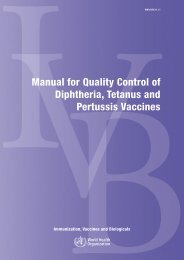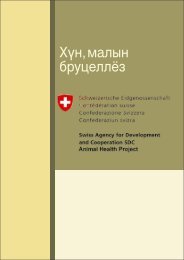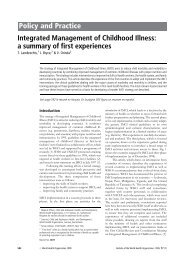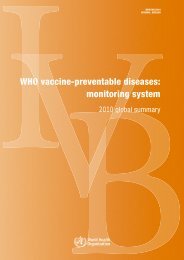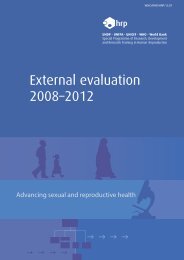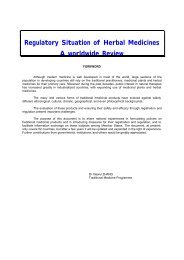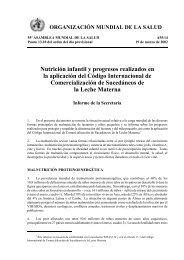IPDE - Extranet Systems - World Health Organization
IPDE - Extranet Systems - World Health Organization
IPDE - Extranet Systems - World Health Organization
Create successful ePaper yourself
Turn your PDF publications into a flip-book with our unique Google optimized e-Paper software.
Discussion and Conclusions<br />
of principal investigators in Geneva. The only significant reservation<br />
about the interview shared by a majority of the interviewers concerned<br />
its length. This was a necessary consequence of the decision to systematically<br />
inquire about all of the PD criteria in the ICDIO and DSM-In-R<br />
classification systems. The mean length of the interview was 2 hours 20<br />
minutes, and there was considerable variation around that figure. If a<br />
patient acknowledged many criteria, the subsequent inquiry for confirmatory<br />
examples and anecdotes prolonged the interview. If few of the<br />
behaviors were endorsed, then the <strong>IPDE</strong> went comparatively rapidly. If<br />
it became evident that the interview was likely to exceed more than one<br />
and a half to two hours, an effort was made to administer it in more than<br />
one sitting to prevent erosion of the quality of the interview from fatigue<br />
or boredom.<br />
To offset the concern about the length of the interview and to make it<br />
more acceptable to a wider range of clinicians and investigators, it was<br />
decided to issue it in modules and to update the DSM-111-R component<br />
to conform to DSM-N. While the longer version of the <strong>IPDE</strong> assesses<br />
all of the disorders in ICD-10 and DSM-IV, separate modules are available<br />
for those who wish to l i t the examination to only one of the two<br />
classification systems. Those concerned with only certain selected disorders<br />
within one of the two systems can also restrict the interview to those<br />
items relevant to the disorders of interest to them.<br />
A self-administered screening version of the <strong>IPDE</strong> is also available. It<br />
is not intended to substitute for the interview, because the literature<br />
indicates that PD inventories and inte~ews do not provide equivalent<br />
diagnoses. The screening inventory merely makes it possible to avoid<br />
interviewing those who are unlikely to receive a PD diagnosis on the<br />
interview. A field trial was undertaken with an early screening version<br />
of the DSM-In-R module in a sample of 258 university ~tudents.'~ The<br />
inventory produced few false-negative cases vis-d-vis the interview,<br />
but as expected it yielded a high rate of false-positives. Of course,<br />
the low literacy rate in some nations precludes its use with certain<br />
populations.<br />
Whereas reliability refers to the consistency with which a diagnosis is<br />
made, validity refers to the accuracy of the diagnosis. The problems<br />
associated with establishing the validity of either an ordinary clinical<br />
interview or a semistructured one such as the <strong>IPDE</strong> are formidable. What<br />
should one use as the 'gold standard? It would be. meaningless to validate<br />
the <strong>IPDE</strong> against clinical diagnosis without first having established<br />
the reliability if not the validity of the clinicians themselves. If clinical




